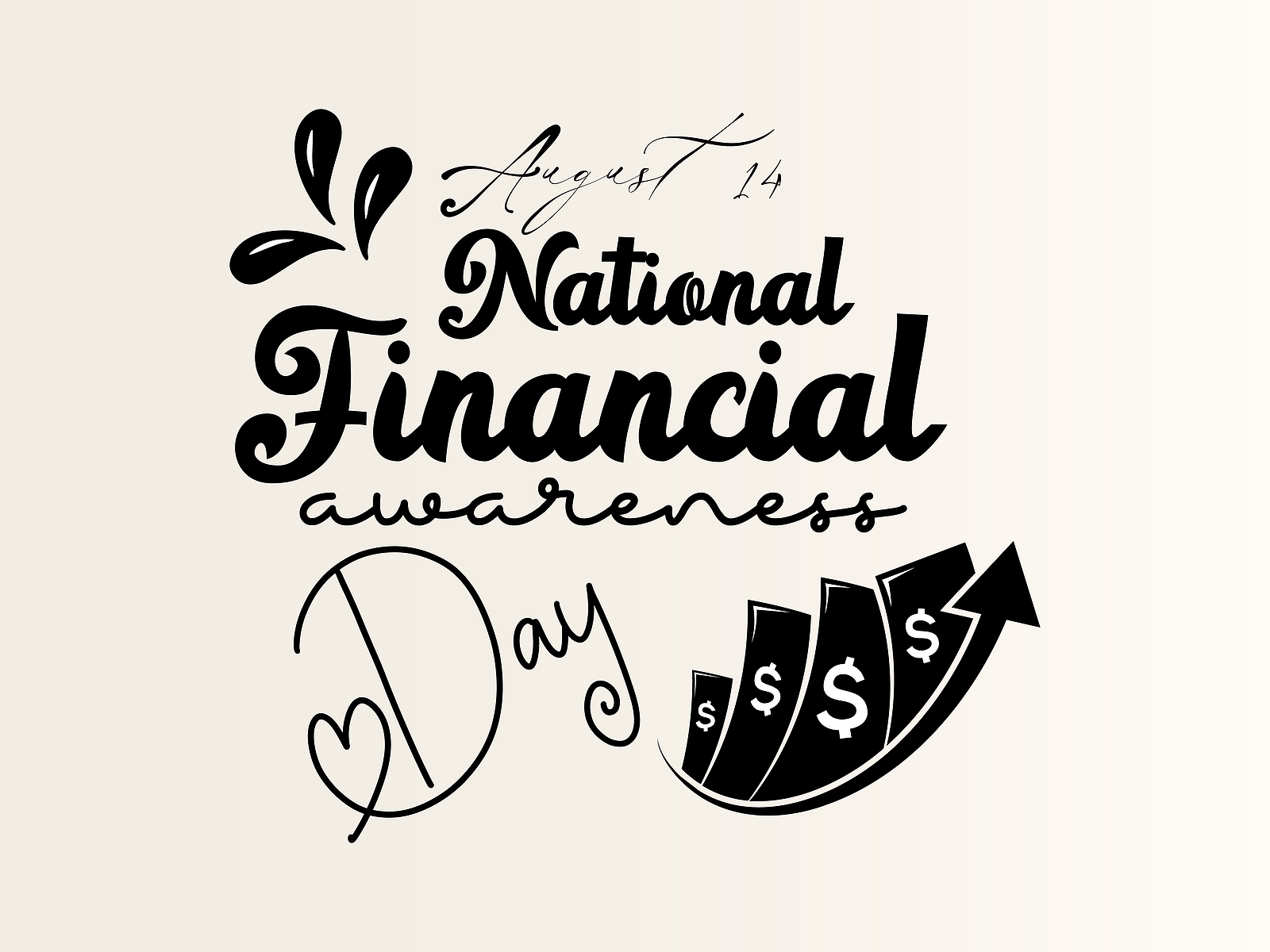
National Financial Awareness Day is August 14th
Is it time for a brief financial checkup? There’s no better time that National Financial Awareness day. Run down this list of tips recommended by multiple experts, for giving your financial life a once-over. This mega-list has something helpful and of value for everyone.
- See where things stand.
Apps like RocketMoney and Mint (both recommended) will link to & import your account balances, payment dates, and other information from bank accounts, credit cards, vehicle and mortgage loans, and even investment accounts, and give you a look at your financial health: what your spending on, and whom you’re paying it to, what your biggest category of expenses — even find and identify micropayments and forgotten subscriptions that you may have forgotten about long ago — but still are sticking to you. - Clean Things Up.
Usually a high-level look at your spending yields some surprises. Too much dining out? 25% spent on clothes? A half-dozen digital subscriptions that add up to $100 a month? Health club you never go to? Annual fees credit cards you didn’t know you had coming up? Take inventory, be honest with yourself, and see what’s in your wallet that you might want to kick out. - Make a [WRITTEN] Budget
Whether you’ve got a small surplus at the end of each month, are living month-to-month, or moving backwards, a written budget is your plan to get your financial business done. Remember, “If you fail to plan, you plan to fail.” If it’s not written, it’s not real. Writing it down, referring to it constantly, maintaining it, and updating it as needed has a magical ability to get your finances in line, almost without major effort — and is the only way that two or more people can do this effectively. - Paying Interest on Credit Cards?
There’s no worse way to waste money (legally, that is), than paying interest on credit card balances. If you aren’t able to pay down credit card balances every month, in full, to avoid credit card finance charges of up to 32.99%, consider refinancing. Refinancing with a term/personal loan can cut that interest down to half or less, and usually has no costs. The interest alone on a $5,000 credit card bill can be just shy of $150 monthly. You can also seek to transfer balances to a low-interest or no-interest card. While this may only be available for those with “fair” to “good” credit, at minimum, the 3-5% balance transfer fee can be less than what you’d pay for one or two months at the current interest rate, and the zero-interest promotional rate can last 12, 15, 18 or even 21-24 months — a savings of several thousand dollars in interest, to pay down debt, create an emergency fund, or add cash flow to your budget. Just be sure you can and do pay it down. - Have other High-Interest Debt?
Look into refinances and other options. Interest rates change daily, and occasional teasers (even if temporary) can provide relief and free up cash to pay down debt, fund emergency needs. Seek to refinance to lower interest rates — and even extend terms if you really need the cash back. - Create an emergency Fund: Emergencies, cash shortfalls, and lead to bad, short-term knee-jerk fixes that are usually more “just what has to happen” than “in line with my financial plan” and usually not in your long-term interest. Being vulnerable to sudden, financially disruptive emergencies is the most dangerous thing to your financial health. Don’t have enough available cash flow to build an emergency fund? Keep reading.
- Reduce Large Expenses (particularly ongoing)
If the above steps pointed you toward a potential issue with large expenses on clothing, dining out, entertainment, toys, etc — be sure to budget in these things. They’re not bad things, certainly, but need a fixed budget to keep your finances on track. Overspending can be the cause of persistent financial woes. Large vehicle expenses or recreational vehicles/boats can be considered for potential elimination. Even smaller expenses can help whittle down your budget — consolidating errands, eliminating second or third cars, shopping around insurance, eliminating impulse buys and instead researching promotions before buying, mending bad habits like smoking… or even known expensive habits like going shopping hungry (or without a written list). Ask for discounts or the newest promotions from cable, internet, phone, mobile providers and any businesses you patronize, at least annually. Usually, rates rise over time, but there’s always a new promotion to move to. - Take a Hard Line on Debt
If you’ve taken the above steps (and even more so, if you’re not quite able to take the above steps due to a lack of cash flow, or bad credit — see below), it may be time to confront debt. There are loads of solutions for this:- Doing the dirty work and paying it down: Dave Ramsey, a well-known radio personality, is a strong proponent of living debt-free. Get information and support at: https://www.ramseysolutions.com/
- Credit counseling services: Usually free of charge, or for donations: They’ll use various pre-negotiated networks of lenders to lower payments interest rates, waive late fees, and even reduce balances to help you get solvent. Closing accounts is a given.
- Debt Consolidation: It may be possible to lower interest rates and get your head above water with a consolidation loan; Most auto/home/personal loan interest rates are fairly consistent and change long-term (ie, so there may not be loads of competitive offers available). Credit card offers, however, are generally the highest possible interest rate — so refinancing to any type of term loan is likely to be half or even 1/3rd the interest.
- Debt Settlement / Bankruptcy Services: If there’s no way to make progress, there are more extreme options. Before considering bankruptcy, debt settlement companies can assist with getting out from under unmanageable debt; Just don’t commit if you’re not committed, and understand the consequences. Neither are fun, nor allow credit to come through unscathed.
- Protect the Financial Health of Your Family
Most people have some significant discomfort around planning for their own death/incapacity. But, it’s crucial that bread-winners think about providing for those they care about, even when they’re no longer around. A basic will. Advance directive. Healthcare power of attorney. Life insurance. Any good insurance agent can point you the right direction for some basic, low-cost life insurance coverage — and while you’re at it, a bit for a non-earning spouse as well. Don’t contemplate it too hard — just do it, and rip it off fast like a band-aid. - Mind Your Credit Score, and Fix It.
In a perfect world, you wouldn’t need to borrow money — but it takes quite a long time and lots of planning to position yourself to not need to borrow at all. Super-near-term (ie, without even an emergency fund), obtaining essentials like a vehicle, or handling an emergency may require it, and it’ll be expensive if your credit is out of whack. With good credit, lots of better options will be available. Apps like Credit Karma can help you stay aware of your credit score, and the near-term impact of your spending and repaying behavior on credit card balances, and identify areas where you’ve been (ahem!) less than perfectly-behaved. But… do know that they make money from advertising credit and other offers to you (ie, “Recommended credit cards for you.” — some may be timely and useful for you, and some may be no good). If you’ve failed to keep financial obligations in the past, take action to remediate, contact creditors and make things right. Many will negotiate down past balances, long overdue, for pennies on the dollar. Many fail to remove derogatory info from your credit report once you’ve satisfied debts. Other info might be wholly in error — an old account connected through a former co-owner or spouse, which never should have been on your report, or simply “other people’s problem.” If you want, there are many “Credit Repair” services that will attempt to remediate this for you — and with their help, you can probably get this done faster, if it’s affordable — what they can’t do in a month or two, they can never do — so don’t end up paying them for a whole year. Just remember, they can only permanently clear up the real mistakes. Your actual debts you’ll need to pay down to get these off your credit report. - Save and Invest:
Start a program of saving and investing (and no, individual stock picking is not on the agenda). Start with options available to you through an employer: particularly if your employer has a 401K with contribution matching. Many will match up to 4% of contributions — essentially up to 100% free money. Seek low/no-fee low/no commission (usually ETFs — or “Exchange Traded Funds.”) Even if your employer doesn’t offer a 401K, you can open a Traditional or Roth IRA (or both) yourself, and make tax-advantaged contributions up to the annual limits. - Watch Your Tax Bill
If you haven’t encountered difficulty yet coming up with the money to Stick to a budget, Create an Emergency Fund, and Save and Invest, likely you’re making good money… and have an escalating tax bill. A dollar spent in taxes is one you don’t have to build your financial health. Most tax professionals are happy to calculate the damage at year’s end and tell you the bill. Far fewer will coach you to the smart money moves that will lower your tax bill. Educating yourself is good policy, on tax deductions and how to qualify are key, including Child Tax Credit, childcare credits, deductible mortgage interest (including buy-down points), property taxes, sales tax, student loan interest, energy-efficient or storm/flood-hardening home improvements, homestead tax exemptions and the myriad tax benefits of owning your own business and investing in it. - Keep an Eye on Security
In the age of phishing, catfishing, ransom-ware, cyber-bullying — “security” takes more than bars on the windows and a safe deposit box. The greatest financial threats may come from clicking an email carelessly, logging into the wrong website, or sharing computers with kids. It could be very easy for an child playing an online game to accidentally help a bad actor access your Acorns or Charles Schwab account and automatically log right in. Take the time to make yourself a hard target and be sure that your assets are secure, with a plan for managing your passwords and protecting accounts from unauthorized access. Lock your phone. Carefully manage passwords with a system like KeeperSecurity.com. Don’t give access to your device to anyone you don’t want deliberately or accidentally making Zelle transfers from your checking account, buying/selling or liquidating your stocks or securities, updating your direct deposit… or who could inadvertently allow another party to do the same.

